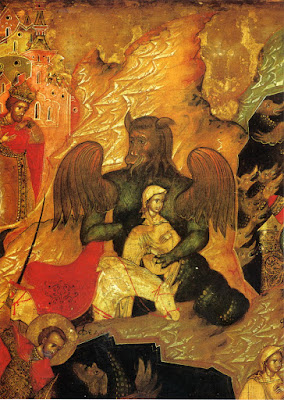During our final session I'm pretty sure I used the phrase, "the prophetic tradition" and I don't think I did anything to define what I meant by that. In fact, I'm thinking I've used that phrase a few times without unpacking it at all. So allow me to geek out a bit.
When I say something like, "Jesus is acting in accordance with the prophetic tradition" what I mean is that Jesus is acting/speaking in ways that are consistent with how Hebrew prophets acted for centuries before him.
The prophet tradition encompasses particular methods and metaphors used by Hebrew prophets to convey a message from God.
The Methods?
- Prophetic Drama - Think of a street performer with an act that's less about entertainment and more about illustrating a point. The prophet Jeremiah was commanded by God to walk around town with a yoke to symbolize God's will that the people of God would be subject to Babylon. The prophet Isaiah was supposed to walk around naked for three years to symbolize God's judgement on Egypt and Ethiopia. Jesus' triumphal entry and cleansing of the temple are right in line with prophetic drama.
The Metaphors?
There are several common metaphors and images employed by Hebrew prophets:
Jesus used each of these metaphors in his teaching.
The Message?Moses was the prophetic prototype. So, starting with Moses, the Hebrew prophets span nearly 1,000 years. Throughout the centuries each prophet faced struggles particular to their time and place. However, pretty much all of their messages can be reduced to this; the relationship between God and the people of God is breaking (or has broken) and God seeks to heal it.
Typically the break in the relationship was created by the people's willful neglect of the relationship manifested in the worship of other gods, the reliance on other kingdoms, or (very often) the oppression or neglect of the poor.
The prophet names the community's complicity in the breakdown of the relationship and typically ends with a message of hope, based in God's faithfulness, of an eventual restoration of relationship.
Jesus fits right into the prophetic tradition. His first sermon is a direct quotation from the prophet Isaiah:
“The Spirit of the Lord is on me,
because he has anointed me
to proclaim good news to the poor.
He has sent me to proclaim freedom for the prisoners
and recovery of sight for the blind,
to set the oppressed free,
to proclaim the year of the Lord’s favor.”
It's important to keep this context in mind as we seek to interpret and understand his actions. It's also important to keep in mind that Jesus goes beyond the prophetic tradition. After reading this section from Isaiah 61 Jesus then says,
'Today this scripture has been fulfilled in your hearing'
Cue mic drop.
I hope that helps shed some light on the prophetic tradition. If you want to go deeper and unpack "prophet" then by all means keep reading.
--
What comes to mind when you think of a prophet?
- Someone who predicts future events...
- A grizzled, unkempt, old man with a chip on his shoulder...
Prophets play a significant role in the scriptures. The Hebrew term for prophet can be defined as "one who is called." When looking at the actions of prophets in the Bible (i.e. what are they called to do), a prophet can simply be defined as, one who speaks truth (i.e. the word of God) to power.
The ultimate Hebrew prophet is Moses. Moses spoke truth to power when he confronted the Pharaoh. He spoke the word of
God to the people when he brought the 10 Commandments to them. Moses even spoke truth to God when he advocated that God spare the Hebrew people. The signs/miracles of Moses all served to convey and further the words/promises of God (e.g. the 10 plagues of Egypt were signs that YHWH not any Egyptian deity was the true God and the Hebrews were YHWH's people). In the book of Deuteronomy Moses makes a number of predictions regarding the future of the people of God. Predictions of the future can be seen as foresight and/or the application of wisdom. Moses had seen the cycles of the relationship between God and the people of God.
As the practice of Israel's faith (and the development of their political/social structure) evolved so did the role of the prophet. The specific duties, societal esteem, and location of the role changed. Two major categories of prophet emerged.
|
Role(s)
|
Notable Examples
|
Notable Stories
|
Inside Prophet
|
-Court Prophets who occupied an advisory position in the court of the
King/Queen
-Cult Prophets attached to official holy sites and often held a
priestly role as well
|
-Nathan is an ideal example of a Court Prophet. Samuel is an example a Cult Prophet.
-Scripture often casts Court Prophets in a negative light (i.e. telling rulers what they want to hear
instead of truth).
|
|
Outside Prophet
|
-Independent Prophets were attached to unofficial holy sites or operated
outside of the religious institution (although
it was not uncommon for them to come from priestly families).
|
-Elijah, Jeremiah, Amos, etc.
-Many of the noteworthy prophets in the scriptures are independent prophets from the
margins.
|
|
 |
| Micaiah before Ahab |
There's a peculiar little story about the decision to go to war. The story involves Ahab (King
of Israel), Micaiah (Independent
Prophet), and Zedekiah (Court Prophet) and it illustrates the prophetic dynamic very well.




